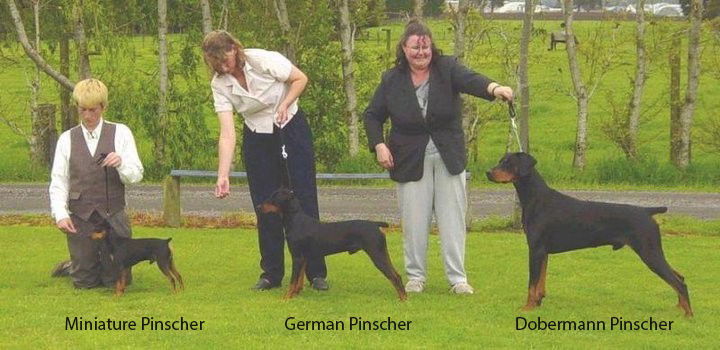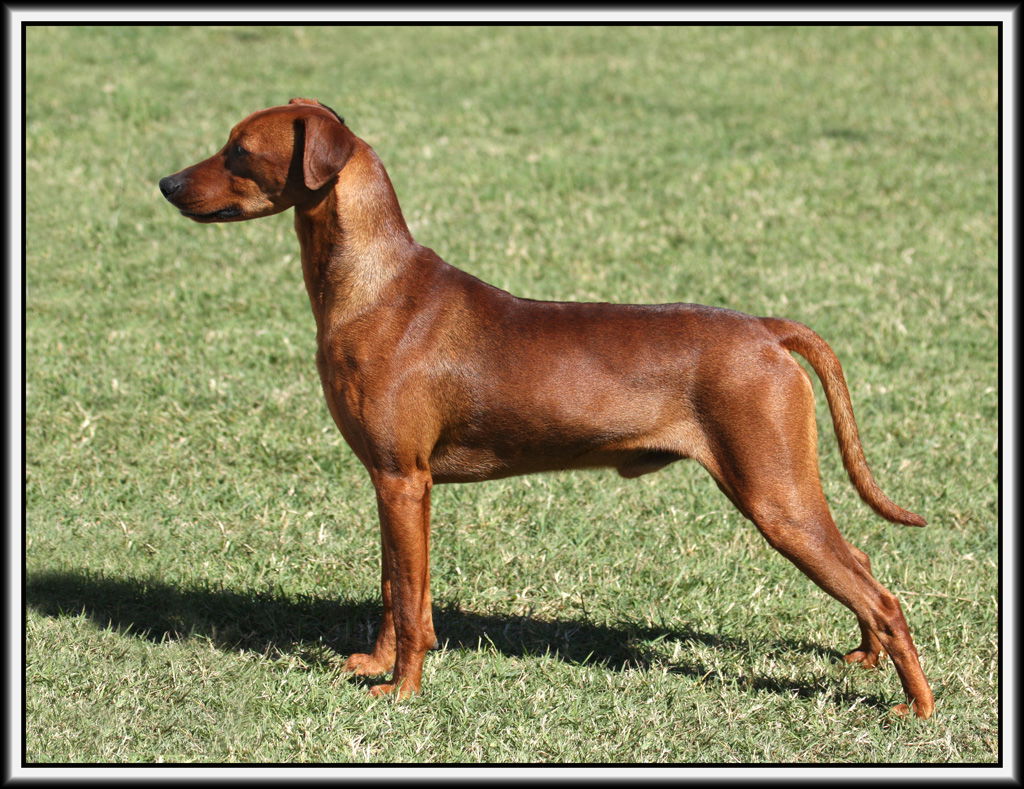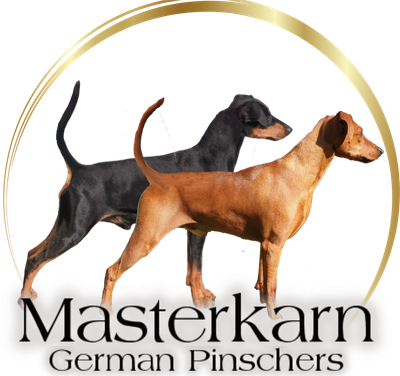About the German Pinscher

The German Pinscher - a very old and exciting breed, is a terrier at heart in both its hunting performance and guarding outlook. It is a natural problem solver given the chance therefore needs a good yard and something to keep its mind occupied. It excels at obedience, agility and the Show ring given an experienced handler or a consistent determined new owner. It is not a breed for those not interested in caring for and giving the dog attention, it is not a kennel breed nor can it be left to its own devices with non active owners.
Our vision
Our vision is to breed the all rounded German Pinscher and Dobermanns that can be worked, shown and still a genuine family dog. Our breeding program is always carefully examined and planned before the mating is done and always with the intention for us to keep a puppy for us to show or train for working as part of our program to develop these breeds.
Our focus is on QUALITY * TEMPERAMENT * TYPE * CONFORMATION * HEALTH & TRAINABILITY with every breeding we plan developing a great healthy, happy dog.
Our vision includes the long term promotion of this amazing and old breeds for the show ring and family dogs. We en-devour to breed quality dogs that can win in the show ring and as companion performance dogs as long term breeders.
We have bred German Pinschers that have gained high obedience and agility training. Each of our dogs proved over and over again they were capable of performing in any or all of these fields and continues to be our vision and goals towards the future.
We are the only breed founder of German Pinschers in Australia still consistently breeding and Showing their dogs.
General Info about the German Pinscher.
The GP is very different in temperament to the Dobermann. They are more active and have a stronger hunting drive. So they need a family who is interested in doing some sort of training from day one. They can be stubborn and determined, especially on a scent. To me, they are a true working dog, who can be trained for almost any dog sport. Having said that they are also very happy to lay on the couch with you during downtimes, which is often, once they get past the first few months of the puppy stage and settle a bit. They love going out and walking, hiking, and doing training. Very family-focused, need to be around you while you are home, but trained right they are happy on their own too.
The German Pinscher can come in 4 colours today. They are the Black and the Blue with red markings, Th Red ranging from lightest red to the darker stag red and Isabella without any markings. All are exceptable colours under the UK breed standard. The FCI breed standard disqualifies the Isabella and the Blue Pinschers. The breeders in Europe are trying to revitalize the acceptance of the Chocolate/rust markings of the GP.
The original colours were the solid black, Blue, Isabella and Reds without markings and the Black, Blue, Chocolate with reddish markings. Also accepted were the salt and pepper colour like the Schnauzer. The Harlequin was a Pinscher that was debated as being the German Pinscher or a separate breed.
Like every other living thing, most GPs have great temperaments; a few can be down right horrid! If you get a dog and find out it's temperament doesn't fit your family, and you have raised it well, and sensibly followed your breeders suggestion with training etc. then you might also check its eyesight for cataracts or any other eye sight problem. If you have and its eyesight is ok please consult the breeder and don't take it to the pound! An experienced breeder that breeds for temperament as well as conformation will have some experience that may be able to help you or ask it be returned for retraining or placement.
Children.
Ethical experienced breeders understand that ALL puppies get on with children; it is as they grow up that respect must be taught to the dogs and children then you will have a happy, healthy family association and companion. German Pinschers are a wonderful family pet raised with children under correct circumstances, as with any breed.
GP's are boisterous, excitable puppies and need to be taught that jumping on, persistent licking or racing past, diving or jumping on or knocking over a 2 year old is not acceptable and things will be fine. I personally do not recommend very small children for this among other reasons generally, although we consider the merits and experience of the new owners when making that decision.
The child is viewed as a play partner by the pup and needs to learn the boundaries for puppy and child play. The children need to learn that hanging onto the dogs as walkers and climbing over them or pulling ears is not ok and hurts the dog…
The discerned ethical Breeders/owners I've had contact with want to make sure their dogs go to homes suitable for the breed. No one wants a good dog ruined by a bad owner. And especially a child bitten by an unsuitable dog or through parents that did not teach the children to respect the animals.
GP's and dogs in general have long memories and do not forget injustices from humans or other animals and will retaliate if need be.
The one breed trait that parents need to be aware of is food possessiveness this is often associated with the more guarding type breeds.
Having said that please re-read the top part of this section. To re-affirm our position we recommend that children be old enough to fend off a boisterous puppy by being able to stand up on steady feet and with parents consistently being in view of the pup and child while playing. NO dog of any breed should be left alone with children. NO child can fully train a dog on their own and NEEDS supervision if under 15 years old in general.
Before purchasing the puppy parents need to feel comfortable with their decision.
Other animals.
GP's can get along with other animals and especially other dogs but you need to remember a few golden rules. Socialisation is the key firstly.
The first time your young baby GP [even at 8 weeks old ever thinks of chasing the cat STOP and reprimand it for it. Should it happen again, put it on a leather collar and lead or harness (if very young), put the dog into the same temptation again and let it start the chase. Say NO!!!!! in a loud demanding voice and pull back on the lead at the same time it almost but not quite reaches the cat. It may approach, if the cat allows and sniff (cats instinctively know what dogs are alright and those that are not, well most of them) but NEVER let it chase the cats EVER. The hunt instinct will step in and you will never be able to trust that dog again once it does. Its vermin hunting instinct will kick in properly as young as 6 months, some 3 months, so this is the first of many house lessons you, not the dog, need to be responsible for.
I raised three children with my GP's and Dobermanns; with two cats added recently, so it is proof in the pudding they can be happy family dogs. My older dog- 7 year old will not tolerate one cat and ignores the other, who knows why! So we understand this and work around it, after all she is 7 and the cats are a new addition. The younger two Pinschers ignore the cats after their initial sniff for the Himalayan and have a healthy respect for the older grey Moggie and keep their distance from her. All are allowed inside.
Health
The breed is usually very healthy, robust and have good longevity. Refer to Health pages.
Exercise.They need regular exercise to channel their energy and occupy their mind. Most are not particularly fond of water but can learn to enjoy swimming. Although not common some can open doors with sliding bolts and handles they can pull down, if they are excited or want to do something due to boredom.
It is highly recommended that you do some form of obedience for this breed in particular to help you become the "Alpha pack leader" rather than the dog. This breed is smart and loves to be doing something, anything to occupy their intelligent and active mind and body.
Endurance is their forte' they will trot for miles if they get on a scent. They enjoy a good romp in the field or if loose in a safe area, scent and romp to their hearts delight. Pinschers have no road sense (there realy is no such thing) while in hunt mode and will be hurt out alone or off lead. They will not conveniently "hear" you call in hunting mode either unless very well trained. The more insecure or dependant dog will not roam far from the owners usually.
The modern GP Temperament.
These dogs are very alert, quick and intelligent in their thinking that often out smart some of the people who own them or would want to own them on a regular basis. They are born problem solvers. They have an independent nature so require a firm, strong but never harsh Alpha (all the family [includes the children]) leaders. This is as the Pinscher has always been.
Bred to be vermin hunters and guardians they still have a very strong prey-drive for all things small, furry and squeaky and will dig to get to them. Their sense of smell is as good as any others and I have seen a bitch dig underground to find Witchetty grubs. This breed is perhaps not for the very garden proud.
Like any guardian they need to be able to distinguish between friends (visitors) and those of ill intent (this is a discerning and a thinking dog) . You will not always know why the dog takes a dislike to a complete stranger (or a friend you think is great) IF it is not the dogs normal course, but remember they can sense the things we cannot. Some people have a nervousness or fear around dogs or on some types of medication and this will almost certainly trigger this reaction too. So be aware not all dogs of any breed like all people.
Because they are so cunning smart (instinctively) and intelligent [although not in a human way] they need consistent firm obedience training and socialization is required to have a happy dog and happy owner.
Firm voice, squirt bottle and/or a quick check on the lead works very well. They are very loyal and affectionate with their owners but are generally aloof to strangers as an adult (this does not mean actual avoidance); I would expect a puppy to be more interested in strangers, with a little wariness (not nervousness) as is required in the breed standard. My dogs are very friendly but if they are stand-offish with someone new, then I trust their instincts (unless the dog is nervous anyway) and am reserved with them until I know them better but will always keep the dogs reaction in mind. Possessiveness (Guards things it thinks is his by ownership) is a breed trait too and must be taught this is not tolerated from a young dog.
Most guarding breeds have this trait in varying degrees, in some dogs is pronounced.
A good stable temperament is a must for any training, with good conformation incorporating the sound structure this covers [for a healthy dog]. Speak to your intended breeder about this.
Temperament and conformation must always go hand in hand.
Healthy body (structure= conformation) with a sound mind. Those of you who have ever owned and worked dogs you will understand the importance of this. A dog that cannot physically do the work (Eyes, hips, cow hocked, poor backbends and fronts, tiring to soon etc :) is as useless as a dog that has a poor temperament. No one wants to live with one.
Having said the above I need to clarify the Pinschers "working" definition. This breed is not technically a true working dog as its work is through its own independence not in response to an owner's commands therefore the temperament is especially important. The dog must be socialable and at least be responsive to the owner (calling for mild independence). The both dominate and very independent dog is for the experienced dog trainer only.
Grooming
They groom themselves like a cat, as they use their paws like hands so much so it almost looks like a human trait. A quick spray with a good bit of lavender/rose water and a wipe down with a damp towel is usually all it takes to keep them clean and a bath occasionally. If you feed a high quality dog food or a RAW diet, they are very efficient eaters with minimum output, so cleaning up is easy. They rarely have the "doggie odor".
Summary.
GPs are compact enough to be a great family dog or lap dog and big enough to do something with like Agility, Obedience and Tracking coursing, easy to feed, healthy as far as genetic faults, easy to care for, great to travel with, loyal and affectionate.
This breed always wants to be with you. It won't matter if you are under the car, doing the gardening or just sitting around. They love nothing better than a leisurely walk or romp with you in a safe area. They can mix well with other dogs at parks, but be aware they will retaliate if another dog looks like it will try to dominate them. Look for the body language/stance and the ears and eyes will tell all. Socialization is a large key here, but don't forget they may have to get down to rank and pack sorting. I do not allow my dogs in "doggie parks" for this reason and we do not know the history of the other dogs or their owners. A self protection thing for myself and my dogs.
Some love kids when raised with children and taught respect from all sides and will tolerate the cats if raised to learn it is not lunch or an intruder in the house.
They are a dog full of expression and gestures unique to this breed.
This is the breed for us and I hope you will consider what is here before you decide if it is for you.
I am only too happy to recommend reputable breeders that we would ourselves purchase a quality pup from should anyone wish assistance- please contact us...after 6.30 pm 0409 493988. Email masterkarn.knls@gmail.com- Come back and visit us again.
Anita
Masterkarn German Pinschers (Australia)
Please enjoy our pages.

YouTube - Masterkarn German Pinscher Kennel



